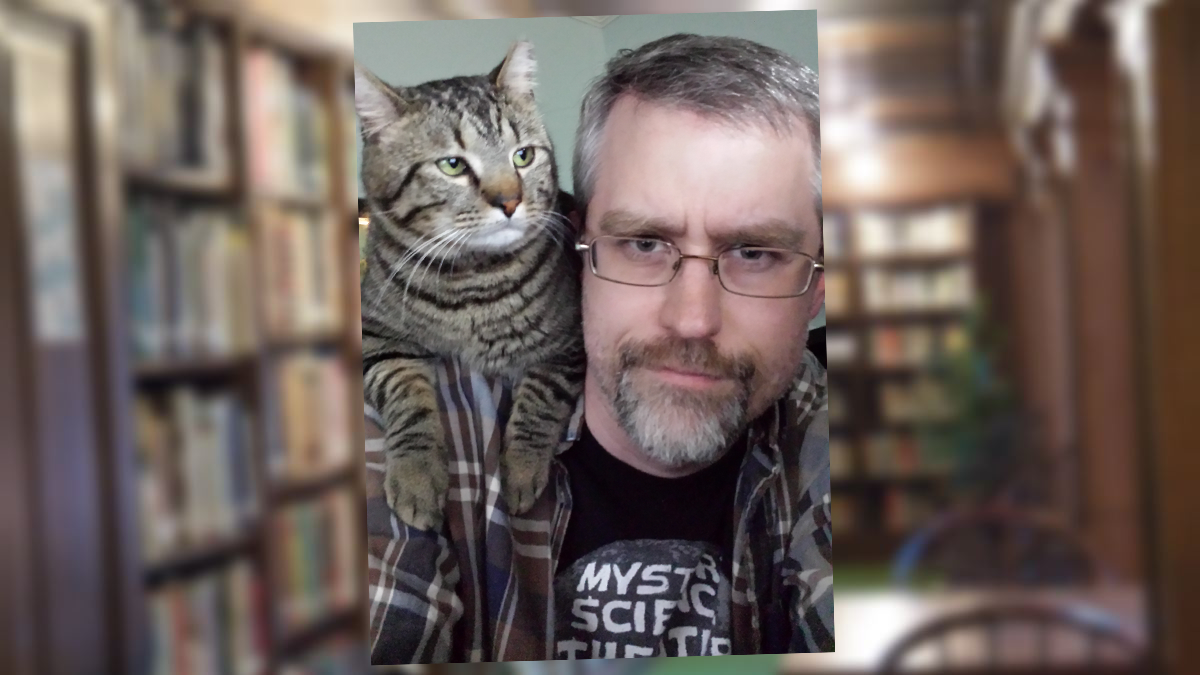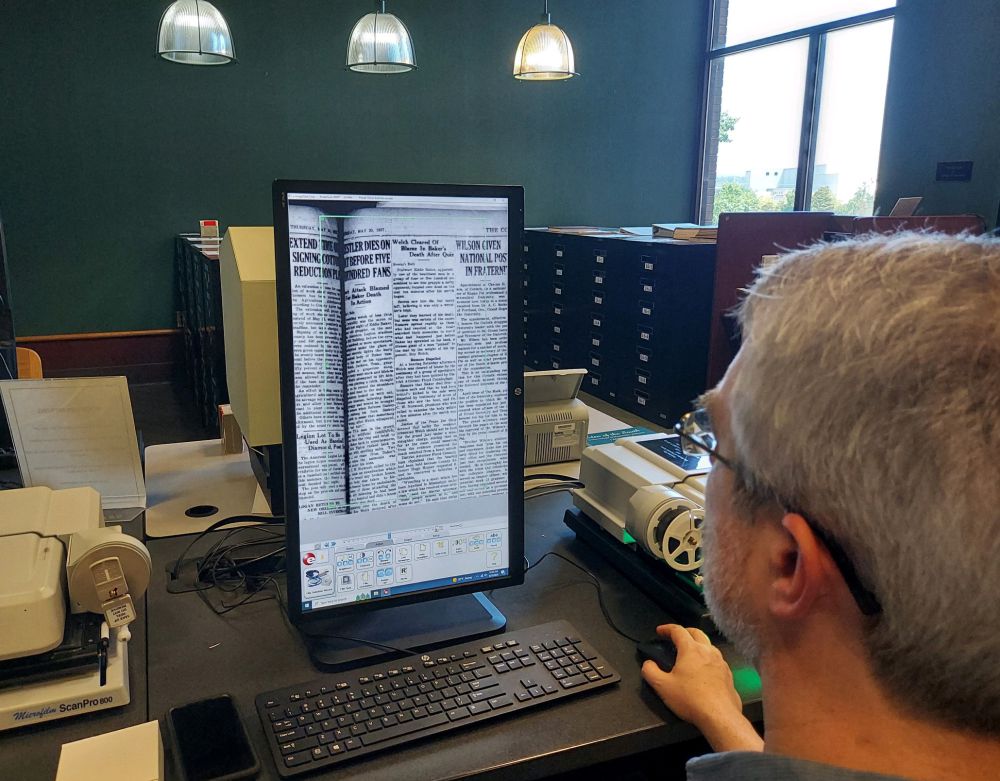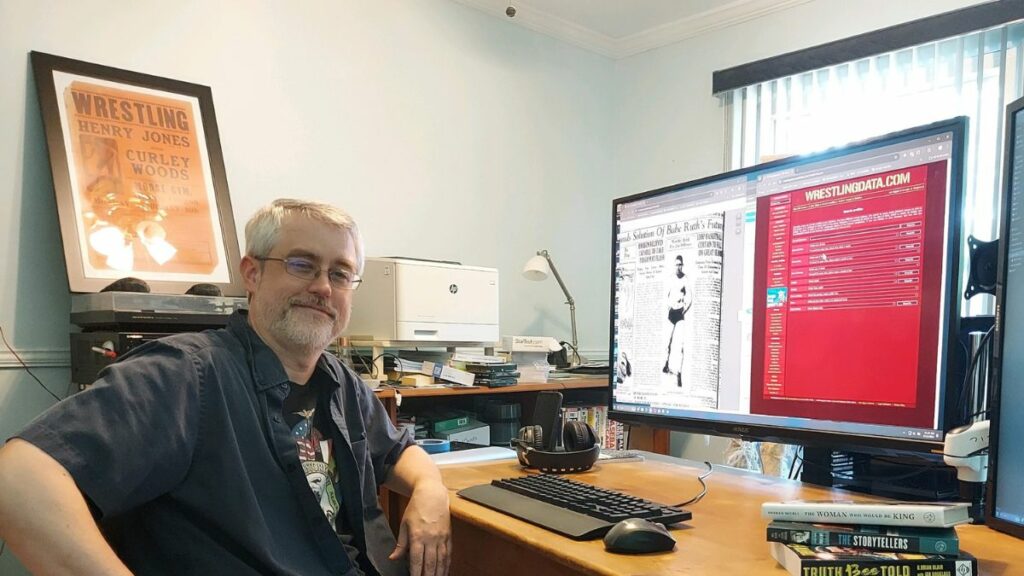There’s an old saying that a picture is worth a thousand words. The first time this writer ever asked author and historian, Jason Presley, for a photo for a SlamWrestling.net article, he emailed me a photo of himself with his cat perched on his shoulder. As a fellow feline fanatic, it’s a photo I have never forgotten.
And when it comes to a thousand words, Presley has definitely surpassed this number with his extreme dedication to pro wrestling history. His meticulousness will be honored at this year’s Cauliflower Alley Club (CAC) reunion with Presley receiving the James C. Melby Historian award. The 2024 CAC reunion will be held from August 19-21 in Las Vegas at the Plaza Hotel & Casino.
The James C. Melby Award is presented each year to an individual who has shown “excellence in the preservation of professional wrestling history through the written word.”
The always humble Presley says the honor was “extremely unexpected.”

Jason Presley and his most demanding editor, his cat, Ernie!
“It is tremendously gratifying to have been selected to this group of previous honorees,” remarked Presley, 48, in an email interview with SlamWrestling.net. “That they even know who I am and think enough of my work to include me in this conversation is more than I would have hoped for. It also means I really need to buckle down and truly earn it before they change their minds! I’m also excited that I’ll get to help choose future honorees.”
As an Army brat who moved around every few years due to his father being a U.S. Army chaplain, Presley says he can’t say precisely how, when, and where he became a fan of pro wrestling. He explained that he has early memories of watching wrestling on television. But he really didn’t get into it until the late ’80s. Then he was hooked.
“I was just really drawn into it,” reflected Presley, who currently resides in Huntsville, Alabama. “And even if I didn’t catch every show, the announcers back then did a great job of slipping in all the background details so you could instantly understand why these two wrestlers were at each other’s throats and why the matches mattered. I loved how the stories continued week to week, like the best comic book series or TV shows, except the stories didn’t just end the next week.”
Presley admitted that while the history he had to learn during his school days didn’t pique his interest, he was drawn to the history of music, movies, and eventually pro wrestling.

Jason Presley hits the library to research in June 2024.
“Watching the matches back in the ’80s and ’90s, announcers would still often bring up names from the past and who they thought the competitors reminded them of,” recalled Presley. “It was years later before I learned that Gorilla Monsoon, Lord Alfred Hayes, and Mr. Fuji had all been wrestlers! So initially (I) was just wanting to learn more about their earlier days in the ring and that just kind of led me down the rabbit hole. There is always more to uncover and every new discovery seems to lead to the next.”
He added, “And at its core, despite all the changes in styles and technology, professional wrestling hasn’t really changed much in how it is booked and presented in the past 100 years. People go on about the ridiculous gimmicks of wrestlers in AEW (All Elite Wrestling) or DDT-Pro (Wrestling), but there was a wrestler in 1910 called The Mysterious Waffle! How can you not want to know more about him?”
Presley’s passion for history led him to write, The Great Pro Wrestling Venues Volume 3 Alabama: 1931-1935, published by Crowbar Press in 2019.
“I started researching Alabama because I wanted to know more about how the sport developed where I lived,” shared Presley. “I asked folks like Scott Teal (owner of Crowbar Press), who worked for Nick Gulas, and Mark James, who knows everything about Memphis, and Mike Norris who knows all about the Gulf Coast scene, but everyone’s knowledge seemed to tail off in the 1950s. Apparently no one had really researched any farther back than the Gulas/Welch and Fields brothers’ days in Alabama.”
It should be pointed out that Presley might have been influenced to write his book after a memorable first pro wrestling show in Florence, Alabama, around 1998 or 1999.
“It was during one of those goofy ‘hardcore’ matches with the usual kitchen implements,” Presley recalled. “One of the wrestlers flung a plunger across the ring at his opponent, who ducked, and it hit a lady in the front row right square in the face! Not fun for her, but has stuck with me to this day.”
A decade before writing his book, Presley honed his historical research skills by diving into his family history.
“I had developed a particular set of skills that made me a nightmare for… no that’s someone else,” joked Presley when talking about completing his book. “Anyway, a great set of research skills from parsing through church records, census returns, voter registration lists, military muster and draft records, immigration records, city directories, school yearbooks, and actual cemeteries turned out to be perfectly adapted for tracking down wrestlers, referees, promoters, and the like from the early 1900s.”
The book took Presley approximately three years to research and complete. He made frequent use of his library card scrolling through microfilm, newspapers, and books at a multitude of Alabama public libraries including those in Birmingham, Decatur, Florence, Jasper, Gadsden, and Montgomery. For Presley, the ultimate highlight of writing his book came when he had the opportunity to meet and interview the family members of the wrestlers Chris Jordan, Stanley Buresh, and Freddie Knichel. “They were all thrilled to talk about their fathers and grandfathers, and were very welcoming and I can’t thank them enough for sharing their stories and photos with me.”
“I really enjoy the hunt,” professed Presley. “Sometimes I think my real hobby is data entry more than wrestling research or genealogy considering how many hours I’ve spent feeding the information I’ve found to one database or another.”
Ernie has decided that there are enough wrestling books on Jason Presley’s shelf already.
Scott Teal, along with being a publisher of a plethora of essential and integral pro wrestling books, is also, like Presley, an author and pro wrestling historian. And Teal doesn’t mince words when it comes to being the latter. It’s obvious he has no time for those so-called “historians” who choose to only rely on Google and websites for their sources and research. He refers to this practice as “the laziest way of doing ‘research.'” But he does praise those historians, like Presley, who use the internet to scour and deep dive online newspaper archives.
“Jason has spent countless hours digging through newspapers, both physically and on microfilm for countless small towns in Alabama – Greenville, Decatur, Troy, Dothan, Anniston, Selma, Jasper and many more,” Teal, who refers to Presley as one of the “professional historians,” wrote in an email to SlamWrestling.net. “There aren’t more than a handful of ‘historians’ who have gone to the lengths that Jason has to compile the information that he has. I can think of no one better to represent pro wrestling historians than Jason Presley. He’s proved himself by the sheer volume of material he’s uncovered.”
For those wanting to follow in Presley’s extreme passion for pro wrestling history, he naturally has some specific advice: “Beyond the obvious need to have a love of the sport, a pro wrestling historian needs to have a driving curiosity and a need to share what they find with the rest of the world. Also, the ability to string together the myriad scraps of information into a coherent story or narrative so that someone else would want to read it and actually understand. Adding context to the names, dates, and places is everything.”
For Presley it’s the final step that he finds most difficult. He admitted: “I can dig to the point (where) I can tell you a three-generation genealogy of a wrestler from the 1920s, finding them in passenger lists, city directories, census and immigration records, but turning all that data into a compelling tale is what puts me in awe of so many of the previous recipients of this honor.”
Presley acknowledges several pro wrestling historians that have inspired his work and continued fascination with the sport.
“I hate to leave anybody out, but of those (historians) I’ve made any kind of personal connection with, Don Luce (RIP) was just so welcoming and willing to share everything he had (which was a lot) and was so much fun to talk to,” shared Presley. “Scott Teal who was so open to help me with my first book and who has published well over 40 books (because that’s just what is on my shelves). Mark Hewitt who seems to know something about all the middle and welterweight wrestlers I dig into, he having been researching there 20 plus years before. Steve Yohe who is happy to talk wrestling history with anyone who will listen and who has done such important work on Ed (Strangler) Lewis and the history of the sport in California. (Dr.) Nathan Hatton who comes at the subject from the academic, cultural, and physical sides, and makes it all very engaging. John Cosper who is slowly building a library of biographies of largely forgotten, yet extremely important, figures in wrestling’s last 100 years.”
In addition to accepting the James C. Melby Historian award, Presley’s future plans include finishing The Great Pro Wrestling Venues Alabama: 1936-1940 for Crowbar Press. He says he would then like to compile a comprehensive book on welterweight and middleweight wrestlers, subjects that he has been feverishly researching already.
“I’d like to think the work we do in some ways breathes new life into some of these names and their stories, at least for a while, as people rediscover them years after their time has passed,” Presley concluded.
BONUS CONTENT FOR THE PRO WRESTLING BOOKWORMS
SlamWrestling.net asked Presley to share with our readers some of his favorite pro wrestling results books expertly paired with pro wrestling autobiographies and biographies. His replies:
From Crowbar Press, The Great Pro Wrestling Venues Volume 4 Japan: The Rikidozan Years, from Haruo Yamaguchi, Koji Miyamoto and Scott Teal, this is the first such book on Japan, and it goes into tremendous detail on the early days of pro wrestling in Japan. It would connect well with the autobiographies of Lou Thesz and Freddie Blassie, as both spent a LOT of time in the ring with Rikidozan, and Thesz was basically around for the whole evolution of the business in Japan up through the early 1990s.
Again from Crowbar Press, The Great Pro Wrestling Venues Volume 6 Amarillo: 1911-1960 by Kriss Knights and Scott Teal, and Jason Freeman’s Wrestling on the Staked Plains: Lubbock, TX 1933-1980 would pair well with Terry Funk’s More Than Just Hardcore. While Freeman’s book is mostly just straight results, he does include some photos, ads and clippings, but the time period covered dovetails well with Knights’ book which includes a lot more in the way of context, and both books cover the history of what became the Funks’ Amarillo territory.
Yet again from Crowbar Press, The Great Pro Wrestling Venues Volume 1 Wrestling in the Garden, 1875-2019 The Battle for New York — Works, Shoots & Double-Crosses by Scott Teal and J Michael Kenyon goes well with both Tim Hornbaker’s Captiol Revolution: The Rise of the McMahon Wrestling Empire, about the rise of the McMahon promoting dynasty and also with Nikita Breznikov’s (with Teal) When It Was Real which covers the WWF in the 1970s from a dedicated fan’s perspective. For that matter, throw in Roberta Morgan’s classic Main Event from 1979, to add contemporary coverage with some great Frank Amato and George Napolitano photography. And of course Larry Zbyszko’s Adventures in Larryland gives a good in-depth look at his feud with Bruno Sammartino in the late 1970s.
Mark James‘ books covering the 1950s, ’60s and ’70s, pair well with Ron Hall’s Sputnik, Masked Men, and Midgets: The Early Days of Memphis Wrestling, which I believe was the inspiration for the Memphis Heat documentary. Hall’s book contains an enormous selection of photos, clippings, programs and other memorabilia of Memphis from the 1950s to mid-1970s. I would also include the autobiographies of Bill Dundee, If You Don’t Want The Answer, Don’t Ask The Question and Jerry Jarrett’s (with James) The Best of Times to help fill in more of the 1970s. James also published Memphis Wrestling History: Cards, Matches, Results & Newspaper Clippings Vol. 1, which is over 600 pages of newspaper clippings documenting the entire Welch/Gulas era in Memphis, as well as most of the Jarrett/ Jerry Lawler years.
2024 CAULIFLOWER ALLEY CLUB HONOREES
- Iron Mike Mazurki Award: Sting
- Lou Thesz/Art Abrams Award: Kurt Angle
- Karl Lauer Independent Promoters’ Award: David McLane
- Jim Ross Announcers’ Award: Jim Ross
- Women’s Wrestling Award: Allison Danger
- Tag Team Award: The Dudley Boyz
- Men’s Wrestling Award: Buff Bagwell
- Lucha Libre Award: Negro Casas
- Red Bastien Friendship Award: Lori McGee Hurst
- Independent Wrestling Award: “Night Train” Gary Jackson
- Charlie Smith Referee Award: Bill “Fonzie” Alfonso
- REEL Award: Todd Bridges
- James C. Melby Historian Award: Jason Presley
- Courage Award: Black Bart (Rick Harris)
RELATED LINKS
